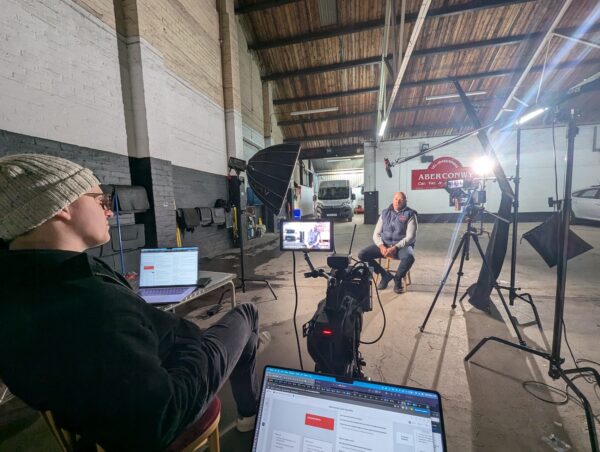Latest News | 27 May 2021
Experts share their top tips on getting in shape for office return

As the lockdown eases, many of us will find ourselves being beckoned back to the office. After more than a year of the pandemic, going back to the workplace can feel like a daunting prospect. To help with this transition, Marketing Derby approached a group of leading wellness experts to offer their top tips to ensure that when we do go back, we are in the best mental and physical shape possible.
REBECCA SMITH – psychotherapist and consultant at The Peachy Mind
Our mental wellbeing isn’t dependant on us never experiencing difficulties. It is dependent on us knowing how to navigate them successfully.
Building our inner strength improves our ability to utilise the resources and strategies we need to stay well, whether we’re facing small struggles or huge challenges.
While short-term gains can feel good, I want to share with you three tips, which, when repeatedly practiced over time, will result in sustainable changes to your mental wellbeing.
-
Self- Compassion. Being on our own side during times of challenge has been shown to help us to feel calmer, more in control and able to respond rather than react. Self-criticism can be motivational in the short-term but ultimately leads to lower mood and decreased self-esteem. Start with your inner dialogue and ask the question: How would I talk to a friend in this situation?
-
Practice Gratitude. Thinking about and expressing gratitude has multiple benefits: it reduces stress, boosts our mood and strengthens our relationships. In addition, it helps us to build an emotional reserve of good experiences so we can have a more a balanced perspective and be less impacted by negative events.
-
Personal Values. Get to really know what’s important to you. Who do you want to be? How do you want to show up for the people around you? Our values are what can guide us during challenging times. They can help us to ignore the unhelpful stories and worries our brains often create. When our values guide our next steps, we are more motivated and in the longer-term experience greater wellbeing and happiness.
CAT RHUN – marketing director at Orangetheory Fitness
The World Health Organisation recommends getting at least 150 minutes of moderate aerobic activity or 75 minutes of vigorous aerobic activity a week.
But how do you start a new exercise routine, especially after almost 12 months in lockdown?
If you’re not used to working out regularly, check in with yourself and recognise your limits. If at any point you feel pain or discomfort while exercising, stop and rest before continuing. Pushing through the pain can exacerbate or even cause injuries.
Another great way to stay motivated and accountable is by building or joining a fitness community. Whether you prefer team sports, competitive workouts, or solo runs, fellow exercisers can provide the perfect support and inspiration.
Keeping a log of your workouts and tracking progress are a great way to encourage your commitment and can be very encouraging to look back on how far you’ve come as you progress.
A good routine combines cardio-based workouts alongside strengths workouts to keep every part of your body fit and healthy. It is also important to exercise different muscle groups and mix up your workouts instead of sticking solely to a single form of exercise.
Many people start exercising with maximum effort, working out too long, and at high intensities. Muscles and joints can then become sore or injured. Make sure you plan time between sessions for your body to rest and recover.
Finally, remember that this is YOUR journey. Your body, your health, and your achievements.
Orangetheory Fitness Derby is currently offering discounted founder memberships. Book your free class today at www.otfderby.co.uk.
CHLOE MAUDSLEY – managing director at Derbyshire Institute of Sport
Mood and resilience are influenced by a steady supply of nutrients to the brain. Keep to a regular eating pattern. Start the day with a nutritious breakfast and choose meals and snacks carefully throughout the day.
Polyphenols are nature’s own antidepressants. You’ll find them in berries, grapes, plums, red and yellow onions, leafy vegetables, turmeric, mint, thyme, basil and ginger among others.
Get cooking with brightly coloured fruit and veg to boost your intake of mood-enhancing polyphenols.
Dehydration affects our mood, skill, accuracy and concentration. If you are thirsty, you’re already dehydrated. Some fluid comes from food but adults need at least six to eight large mugs or glasses of fluid per day, even in mild temperatures. That’s up to two litres (spread over the day) and more if it’s hot, dry or you’re active.
One of the most powerful performance supplements – and the most underappreciated and neglected by many – is sleep. Sleep is the foundation for human health and key for our energy management.
Create a 60-minute night-time routine to help trigger your brain into thinking ‘sleep time’. Gentle exercise, such as walking, stretching, or breathing exercises can help you relax and get to sleep more quickly.
KATE STALKER – lead physio and clinic director at The Sporting Joint
Many people are heading into a new normal of work and life and we’ve developed all sorts of new aches and pains because of change of workstations (if you can call the dining room table a ‘workstation’!), taking up of new activities and sports and the stopping of other things that you used to do a lot of.
Whatever you are going back to, do it slowly. Even if you have been doing gym exercises this is not the same as doing weights at the gym, even if you’ve been doing Yoga with Adriene.
It isn’t the same as the class when there is someone bendier next to you and you want to bend more than them. Take it steady.
Your best position is your next position. Change position regularly whatever position you are in at work.
Sitting: change your lumbar support, chairs, thigh position, stand for a bit.
Standing: Rest one foot on something and swap regularly, stand with wide feet, narrow feet, one foot forward, sit for a bit.
Take deep breaths that move your ribs outwards (and not just upwards with your shoulders!). Why so important? Not just for oxygen to your brain and general blood flow, but your ribs connect to your spine (the bit near your shoulder-blades) and in there sits a really important part of your nervous system called your sympathetic trunk, which controls your response to stress.
It’s important to realise the role that stress plays in pain, both in its magnification and in its creation, so if you are suffering with lots of random niggles and pain without any real ‘injury’, have a good look at just how stressed you are.
RACHEL MORRIS – chief executive at Relate Derby and Southern Derbyshire
Go at your own pace. You’ve been used to living and working in lockdown and this will be different for everyone – try and think of what you need rather than rush to be like everyone else.
Try not to avoid things. There will be some things you have not done for a long time and will be anxious about but you will have done them in the past, so try to have a go.
Check you have the right information. Check what everyone has been told and use the recognised sites to get your information to avoid disinformation.
Discuss the changes with work colleagues, employers, family and friends. It can help to talk things out loud to help make sense of them.
Make time to relax. Recognise a different pace of life is going to be tiring and just because you are changing your work routine does not mean you should neglect your own relaxation time.
Ask for help of you need it. Sounds simple but can be one of the hardest things to do, it is easier to offer support to others than sometimes ask for your own.
Develop new routines. Structure can go a long way to reduce anxiety about any changes.
Tell someone how you feel. It always sounds different when you share a worry out loud, it often sounds less worrying.
Plan social occasions. Things to look forward to but also so that there is more of a sense of control, you know what is coming up and how you can pace yourself.
Write any worries down. We can spend a long time worrying about something, it can go round and round in your head but writing it down can “park it” and we no longer have to think about it.
SARAH MARKHAM – founder of Calm in a Box
Organisations are considering what new ways of working and what working patterns will look like, as well as how to manage a transition for people around this, where the end destination is not yet entirely clear.
In anticipation of what is to come, employees are likely to be experiencing a range of emotions.
The CALM model, which guides everything we do at Calm In A Box, can support leaders and individuals alike in starting to develop their thinking around how to hybrid for calmer, happier and healthier lives for work/life brilliance in the new normal world.
The C of the CALM model is all about connecting with yourself and connecting with others in a way, which helps us feel we’re doing more of what’s really important to us and what really matters to us at home and at work.
The A of the CALM model stands for All of Me Matters – being able to develop self-awareness to understand your thoughts and emotions and the first building block for self-acceptance and a more authentic way of living.
L is Let Me Have Time for Rest and Recovery – something we all know we’d like to do but often find incredibly difficult, especially during times of change.
During any kind of personal or workplace transition, it becomes even more essential to take some time out.
M is Motivate and Inspire Me to Take Care of Myself and Others – critical as we move to a hybrid world of work and a life with boundaries that are now less clear, as for many of us, taking care of yourself is invariably something that always falls of our to do list.
One way to think about planning for CALM is to adopt a growth mindset around all of these changes – what might you learn from this situation even (or especially!) if something goes wrong.
We are all figuring this out together so, I can guarantee you, you are not on your own on the ‘how to hybrid’ journey.
DR ANDY COPE – from Brilliant Derby, a wellness initiative backed by Derby City Council
Calculate your happiness. According to researchers at the University of London’s Institute of Education, here are some monetary values of happiness:
Seeing friends and relatives is equivalent to a pay rise of £64,000 a year.
Having nice neighbours is worth £37,000 a year.
Excellent health is estimated to be worth £300,000 a year to you.
If you can tick all these boxes you are £401,000 richer. That should put a spring in your step!
We’re all smart – distinguish yourself by being kind. Why? Because the science of positive psychology tells us what we already knew – that the quickest way to make yourself feel good is to do a good deed for someone else.
It doesn’t have to be a big deal. It can be as simple as letting someone out in the traffic or buying flowers for the bus driver. If you get it right, the feelgood factor reverberates with the giver and receiver.
Less anti-social media. No explanation required, other than to remind you that in terms of happiness, one true flesh and blood friend will bring you more happiness than 1,000 Facebook ones. Cut your social media by 50% and spend time with real family and friends instead.
Authors:
-
Rebecca Smith – psychotherapist and consultant at The Peachy Mind;
-
Cat Rhun – marketing director at Orangetheory Fitness;
-
Chloe Maudsley – managing director at Derbyshire Institute of Sport;
-
Kate Stalker – lead physio and clinic director at The Sporting Joint;
-
Rachel Morris – chief executive at Relate Derby and Southern Derbyshire;
-
Sarah Markham – founder of Calm in a Box;
-
Dr Andy Cope – from Brilliant Derby, a wellness initiative backed by Derby City Council.


